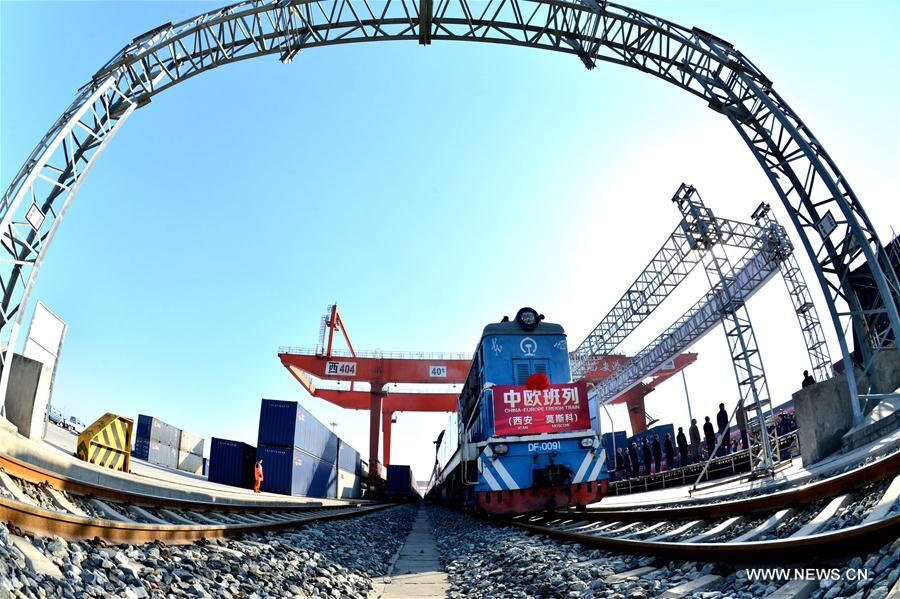Media Report

- Foreign Policy comments: "The Trump presidency hasn't even begun, and the U.S.-China relationship already seems to be in trouble. Tension is fast building around a slew of issues — particularly trade, Taiwan, and the South China Sea — that are inherently irresolvable, and can, at best, be managed. The Obama administration has parried these problems partly with recourse to climate change, a bonding issue that could be deployed at will when things get dicey. So far, the fast-forming administration of President-elect Donald Trump lacks any such glue. It needs to find some, fast. Massive infrastructure cooperation could be just the thing...With Trump entering the Oval Office, all of this is now set to change. Trump has made it abundantly clear that climate change will not be a priority for his administration...But Trump could be persuaded to go a different way. Having been a builder all of his adult life, fascinated as he is by grandiose construction projects, Trump may find OBOR more appealing. He may even be tempted to expand OBOR (or some U.S. version of it) beyond Asia into other infrastructure-deprived regions like Africa, Latin America, and Central America...The result would not only be a more connected world where more people can have access to energy, communication, and transportation networks — one generating economic activity, prosperity, and growth — but also a U.S.-China relationship that's more resilient in the face of the many challenges that will undoubtedly come."
- The Wall Street Journal reports: "China's government said its leader would signal at a global forum next week that Beijing supports multilateralism, in a bid to raise its profile as a benevolent global power amid tensions over the South China Sea and escalating criticism from the incoming Trump administration over Taiwan. President Xi Jinping will emphasize China's support for global cooperation and free trade at a keynote speech on Tuesday at the World Economic Forum in Davos, Switzerland, and in an address to the United Nations in Geneva the next day, the Foreign Ministry said Wednesday...Mr. Xi will assert that China is a responsible country and will 'contribute China's wisdom' in his meetings with political, economic and academic leaders and the media, said Vice Minister Li Baodong. Mr. Xi also will address the bigger questions of 'where mankind came from, where we are and where we're going.' The divisive U.S. election and President-elect Donald's Trump's 'America-first' approach presents China with a chance to extend its global sway and present itself as a force for stability."
- The Associated Press reports: "China said Wednesday it was committed to promoting peace and stability in Asia, even as it sent an aircraft carrier battle group through the Taiwan Strait amid heightened tensions between Beijing and the self-ruled island. The statement in the preface to a Cabinet report on China's policies on Asia-Pacific security cooperation follows heated criticism from the U.S., Japan and others over Beijing's increasingly robust assertions of its maritime claims, particularly in the South China Sea. The report made no direct reference to such concerns while casting Beijing as a force for economic development and conflict reduction. The report reiterated China's claims over South China Sea islands and waters, as well as territories in the East China Sea controlled by Japan...China has been steadily ratcheting up pressure, discouraging Chinese tourists from visiting the island and intervening to prevent its participation in international forums. 'Looking ahead in 2017, the development of cross-strait relations faces increased levels of uncertainty and the challenge of risk has risen,' Ma Xiaoguang, spokesman for the China cabinet's Taiwan Affairs Office, told reporters Wednesday."
Calendar
- 2017-01-10 China Joins Davos as Trump Presidency Vies for Spotlight
- 2017-01-09 Alibaba's Jack Ma met with Trump to talk jobs
- 2017-01-08 China capital controls help slow cash outflows
- 2017-01-06 China Doubles Down on Defending Its Currency
- 2017-01-05 China to invest £292bn in renewable power by 2020
- 2017-01-04 With Choice of Trade Negotiator, Trump Prepares to Confront Mexico and China
- 2017-01-03 Wilbur Ross’s Chinese Love Affair
- 2017-01-02 Surge in Chinese corporate investment into the US
- 2016-12-23 In China's Tiny Catholic Community, Hopes Rise For Beijing-Vatican Ties
- 2016-12-22 Trump taps China trade critic Navarro for new White House post
News
- The Wall Street Journal Xi to Stress China's 'Responsible' Global Role in Davos
- The Associated Press China Aircraft Carrier Passing Through Taiwan Strait, Taipei Says
- The New York Times China, Fanning Patriotism, Adds 6 Years to War with Japan in History Books
- Reuters Bitcoin slides as China's central bank launches checks on exchanges
- The New York Times China Sends Aircraft Carrier Into Taiwan Strait
- The Wall Street Journal China Is Open to Criticism That Is 'Intellectually Sound'
- The Washington Post Chinese delegation open to meeting Trump's team at Davos
- Bloomberg Best Asian FX Forecaster Fears Trump Risk More Than China: Q&A
- The Financial Times Chinese investment in EU dwarfs flow the other way
- The Financial Times McDonald's faces test after ceding control of China restaurants
- Bloomberg Chinese Investors Have Money, Want Biotech and Don't Fear Trump
- Reuters Taiwan scrambles jets, navy as China aircraft carrier enters Taiwan Strait
- The Washington Post Philippines won't raise legal victory vs. China at ASEAN
Commentary
- Foreign Policy A New Way to Hold the U.S.-China Relationship Together
- The Wall Street Journal: China Real Times Report Edifice Complex: China Is the World's Largest Skyscraper Factory, Again
- Forbes How China Will Fight A U.S. Trade War And Lose
- Quartz China is rewriting textbooks so its "eight-year war of resistance" against Japan is now six years longer
- Barron's PBoC Investigates Bitcoin Exchanges For "FX Management"
- The Diplomat Robert Rubin on the Future of US-China Relations
- Barron's Buy China Real Estate Developers: Goldman Upgrades COLI, Guangzhou R&F
